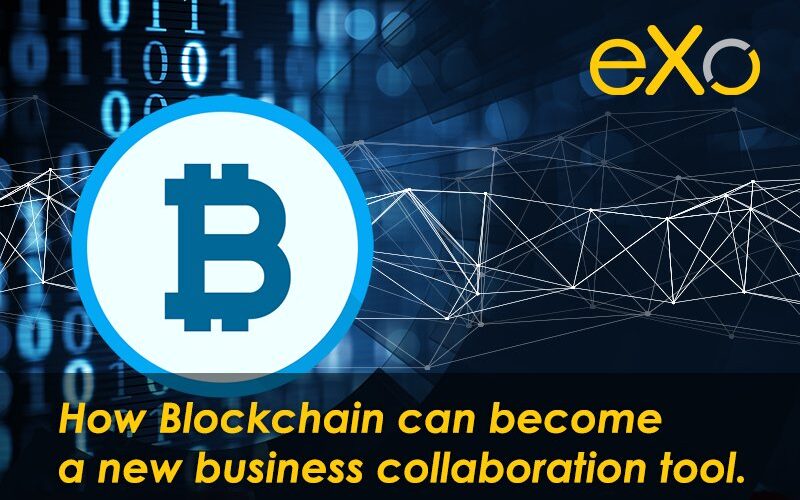- Walid Hamrouni
- February 21, 2018
How Blockchain Can Become a New Business Collaboration Tool?
Blockchain is currently the hottest topic in the tech world. You probably have heard about it through one of its application: cryptocurrency (Bitcoin or Ethereum among others).
However, this distributed ledger technology is quickly creeping across numerous industries.

Content
Blockchain is intrinsically secure and provide a high potential for improving systems operation while cutting costs and creating new revenues streams.
According to a Deloitte survey, Blockchain should be this year a key business focus for various industries. “the impact that blockchain will have on businesses in various industries is not yet fully understood” says David Schatsky, managing director at Deloitte.
However, he believes that Blockchain’s diversity allows it to address numerous business needs.
The bottom line of this report is that: both the understanding and commitment to this technology varies between industries, but most of them see it as disruptive.
In fact, companies that already embraced Blockchain found a new path in transmitting both money and sensitive data securely. This innovation paved the way for cryptocurrencies like Bitcoin, making it easier to perform transactions such as USD to BTC conversions in a secure and efficient manner. For those searching where to buy bitcoin in Canada, it has become more accessible than ever.
This path allowed these companies to enable a new business dynamic. Blockchain is a decentralized electronic, encrypted ledger or database platform.
Simply put, you can immutably store digital data, allowing this information to be shared securely across networks and users.
It is a peer-to-peer (P2P) network combined with a distributed time-stamping server, enabling an autonomously managed databases.
Executing Contracts
Blockchain distributed ledgers can be used to automatically execute contracts. Indeed, the P2P database first capture all the terms and conditions, then uses data shared among nodes and servers to determine when terms and conditions have been met and authorizes payment.
AIG, IBM and Standard Chartered Bank, recently worked on a project to enforce one of the most complex types of insurance policy: a multinational policy.
They created a master policy including 3 local insurance policies from: Singapore, Kenya and the U.S., into a “smart contract” based on blockchain technology providing a shared view of policy documentation and data in real time.
According to IBM, the solution is designed so that all stakeholders involved (brokers, regulators and auditors) can collaborate more efficiently and effectively on the network.
Basically, the solution gives a unified look of policy and payment data and documentation, allowing all parties involved to make informed decision based on a common set of trusted data.
The solution has been designed to ensure trust and transparency. When data about the policy is stored on the blockchain, all authorized parties of the network have a single view of the data, and no one can make changes without every parties approval.
Since this solution is blockchain based:
- The level of transparency helps narrowing down errors and fraud, in addition of the need for parties to contact each other to view data (of policy and payment) as well as the status of policies.
- It enables the ability to keep track and record events and payments in each country associated to the insurance policy.
- No party can modify or delete any record without all parties involved in the network.
Blockchain-based “smart contracts” can be used to handle automatically payments between organizations.
According to a recent report from Accenture, Blockchain technology could help reduce by 30% infrastructure costs for 8 of the 10 largest investment banks “translating to $8 billion to $12 billion in annual cost savings for those banks.”
Operations in the financial service industry is overflowing with inefficiencies, because organizations in the process should maintain its own data, and must communicate with others update status on the process.
This leads usually settlement to be made in about two days, thus forcing these institutions to set aside money, that could have been invested elsewhere.
Now, thanks to the blockchain’s ability to share data instantly with each organization involved in the database or ledger, the need for reconciliation, confirmation and trade break analysis is eliminated to give a more effective and efficient settlement process.
If this sounds relevant to your ambitions, it’s worth participating in a blockchain programming bootcamp offered at RareSkills. You’ll get the training and support you need to understand smart contracts comprehensively.
Allowing Businesses to Avoid Transaction Fees
Financial institutions (such as banks) administrate most payment systems available. Whenever money is transferred between organizations, there is a transaction fee associated to it, especially for SMEs.
On the other hand, large firms always enjoyed an advantage in the global market, whether it is the capital to absorb the cost of such fees, getting lower fees, better protection of intellectual properties and so on.
Now, Blockchain technology helps SMEs to compete in the global market by cutting these transaction fees.
For example, Veem a B2B payment service leveraging Blockchain, allows its customers to transfer money internally for no fee. In comparison, a larger banks charges about 50$ per transaction.
Marwan Forzley, Veem’s CEO sees blockchain as an opportunity to remove intermediaries from transactions.
By doing so, he believes that it will directly impact the experience and timing these transactions from SMEs, allowing them to be more competitive in the market.
In the end, we can see that this technology opens up new ways to share data or conduct business between organizations.
Blockchain offers a new infrastructure that allows enterprises to be even more efficient and effective than ever.
eXo Platform 6 Free Datasheet
Download the eXo Platform 6 Datasheet and
discover all the features and benefits
discover all the features and benefits
- Tags: Collaboration, Tips & Tricks
Rate this post
I am a product marketing specialist and tech enthusiast. My role at eXo is to support marketing and operational activities for our digital collaboration tool. I will mainly blog about digital transformation, collaboration, open-source tech, and how to navigate through eXo platform.
Related posts
- All
- eXo
- Digital workplace
- Employee engagement
- Open source
- Future of work
- Internal communication
- Collaboration
- News
- intranet
- workplace
- Knowledge management
- Employee experience
- Employee productivity
- onboarding
- Employee recognition
- Change management
- Cartoon
- Digital transformation
- Infographic
- Remote work
- Industry trends
- Product News
- Thought leadership
- Tips & Tricks
- Tutorial
- Uncategorized
Leave a Reply
( Your e-mail address will not be published)



No one ever talks about Managing Block chain systems on the long run:
Shutting down a specific application’s data
Corrupt data ramifications
How are corrections made, ammendments to data etc.
Energy consumption on the world
Retiring servers and new tiers
it seems eXo will organize an ICO
eXo = Business Collaboration ToolHow Blockchain Can Become a New Business Collaboration Tool? > How Blockchain Can Become a New eXo ?
when moon ? when lambo ?
I appreciate your work on Blockchain. It’s such a wonderful read on Blockchain.Keep sharing stuffs like this. I am also educating people on similar technologies so if you are interested to know more